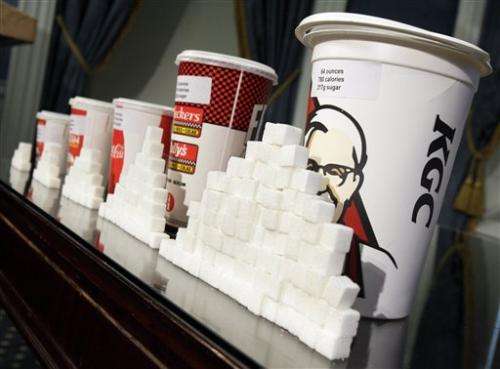NYC mayor: Soda decision just 'temporary setback' (Update)

Eateries around New York City have gotten a last-minute reprieve from the first ever U.S. ban on big sugary drinks, but Mayor Michael Bloomberg is urging them to shrink their cups and bottles, anyway.
After a judge struck down the 16-ounce (473 milliliter) size limit for sodas and some other sweet drinks as arbitrary and outside city health regulators' purview, Bloomberg defended it as a groundbreaking anti-obesity effort and all but challenged businesses to comply out of concern for their customers.
The big drinks ban sparked reaction from city streets to late-night TV talk shows, celebrated by some as a bold attempt to improve people's health and derided by others as just the latest "nanny state" law from Bloomberg during his 11 years in office. The New York Post has pictured Bloomberg as "Mayor Poppins" alongside stories about the ban.
"Despite yesterday's temporary setback, I don't think there's any doubt that momentum is moving in our direction," Bloomberg said Tuesday during a visit to a Manhattan diner that is now voluntarily complying with the policy, ditching 20-ounce (600 milliliter) bottles of soda and reserving 24-ounce to-go cups for iced coffee.
"We are confident that we will win that (appeal), but while the legal case plays out, the conversation we started about the dangers of the portion sizes of sugary drinks has prompted many people ... to take action," he said.
A few hours later, the city filed formal notice of its plan to appeal. The American Beverage Association and other business groups that sued the city said they felt the judge's decision was strong and were "confident in the ruling,"
The drinks limit follows other efforts by the Bloomberg to improve New Yorkers' eating habits, from compelling chain restaurants to post calorie counts on their menus to barring artificial trans fats in restaurant food to prodding food manufacturers to use less salt. The city has successfully defended some of those initiatives in court.
The city has also won fights over outlawing smoking in bars and offices, and has promoted breast-feeding over infant formula. Last week, the Bloomberg administration announced a campaign to warn young people they risk hearing loss from cranked-up earphones.
These efforts are a sign of how aggressively Bloomberg sees the city's role in pushing New Yorkers to improve their health habits and nudging other cities to do likewise. But it remains to be seen whether the city that was first to compel chain restaurants to post calorie counts and bar artificial trans fats in restaurant food will ultimately prevail in capping soda portions.
For now, though, the ruling it means the ax won't fall Tuesday on supersized sodas, sweetened teas and other high-sugar beverages in restaurants, hot dog carts, arenas and even coffee shops.
Monday's ruling came just hours before the restriction was to take effect, handing a victory to the beverage industry, restaurants and other business groups that called the rule unfair and wrong-headed.
"The court ruling provides a sigh of relief to New Yorkers and thousands of small businesses in New York City that would have been harmed by this arbitrary and unpopular ban," the American Beverage Association and other opponents said.
State Supreme Court Justice Milton Tingling said the restriction was arbitrary because it applies to only some sugary beverages and some places that sell them. For various reasons, it doesn't cover alcoholic drinks or many lattes and other milk-based concoctions. Nor does it doesn't apply at supermarkets or many convenience stores.
"The loopholes in this rule effectively defeat the stated purpose," Tingling wrote in a 36-page ruling that examined the scope of power that should be afforded an administrative board for regulations.
Tingling, a Democrat elected to the trial court bench in 2001, said the Bloomberg-appointed Board of Health intruded on the elected City Council's authority when it imposed the rule. He cited in part a case from the 1980s which questioned whether a state public health council had the authority to regulate smoking in public places.
The appeal likely will turn on whether a higher court "feels that the mayor has gone too far in ruling by decree in bypassing City Council," said Rick Hills, a New York University law professor who has been following the case.
To attack the finding that the law is arbitrarily ridden with loopholes, city lawyers could argue that any given regulation can't be expected to get at every source of a problem, said Cary Coglianese, a University of Pennsylvania Law School professor who studies regulatory processes.
The appeal could easily take a year or more, potentially leaving the next mayor with a decision about whether to keep pressing it.
In defending the rule, city officials point to the city's rising obesity rate—about 24 percent of adults, up from 18 percent in 2002—and to studies tying sugary drinks to weight gain.
The judge acknowledged the impact of obesity on the city's residents, and noted that those bringing suit likewise didn't dispute obesity is a significant health issue, but questioned how much sugary drinks can be blamed for it. Ultimately Tingling said whether the issue of obesity is an epidemic is not the key issue here, but whether the board of health has the jurisdiction to decide that obesity is such an issue that it could issue a cap on consumption of sugary drinks.
The judge found that the regulation was "laden with exceptions based on economic and political concern."
Critics said the measure was too limited to have a meaningful effect on New Yorkers' waistlines. And they said it would take a bite out of business for the establishments that had to comply, while others still could sell sugary drinks in 2-liter bottles and supersized cups.
Copyright 2013 The Associated Press. All rights reserved. This material may not be published, broadcast, rewritten or redistributed.















